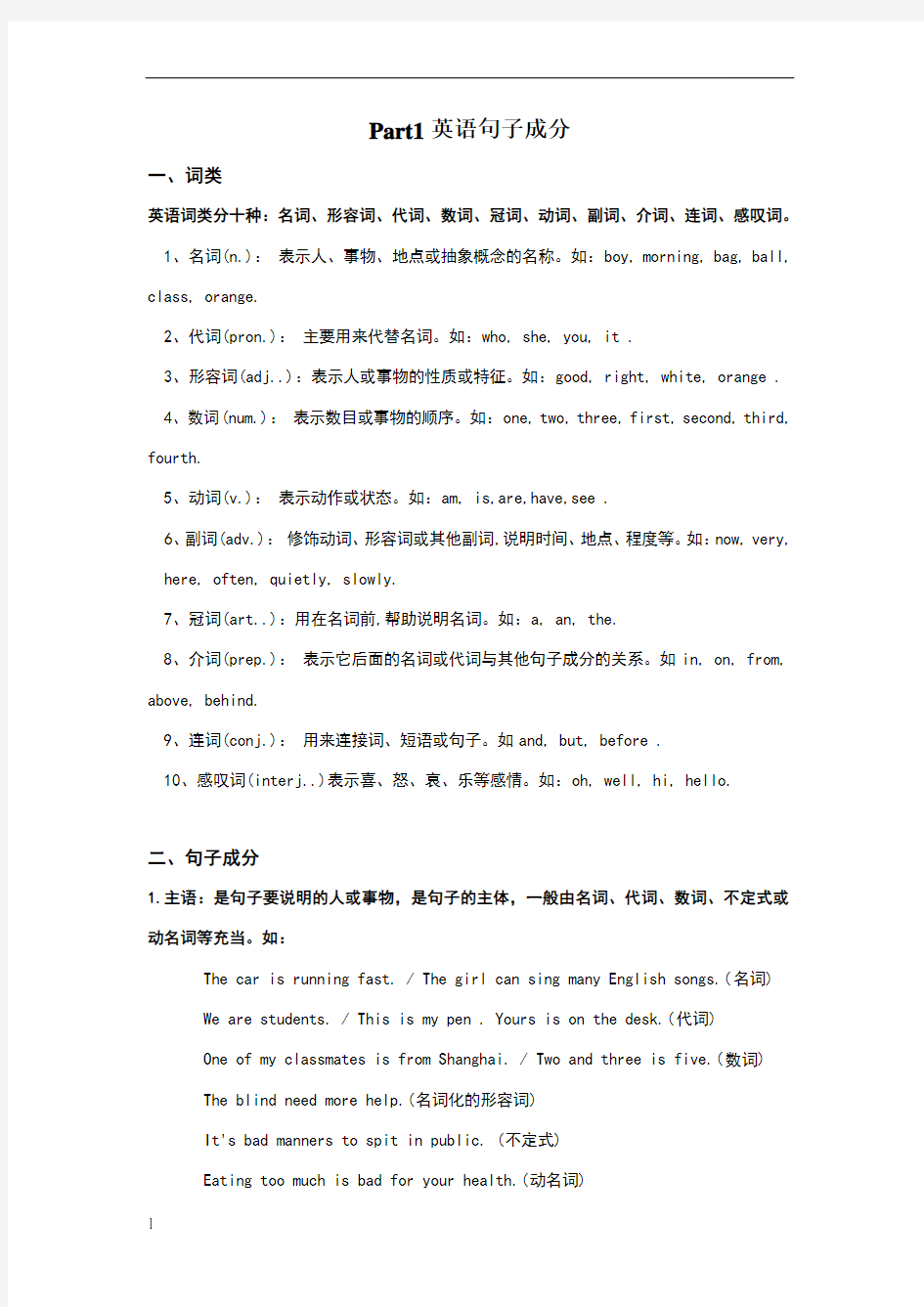高考英语句子成分分析

- 1、下载文档前请自行甄别文档内容的完整性,平台不提供额外的编辑、内容补充、找答案等附加服务。
- 2、"仅部分预览"的文档,不可在线预览部分如存在完整性等问题,可反馈申请退款(可完整预览的文档不适用该条件!)。
- 3、如文档侵犯您的权益,请联系客服反馈,我们会尽快为您处理(人工客服工作时间:9:00-18:30)。
Part1英语句子成分
一、词类
英语词类分十种:名词、形容词、代词、数词、冠词、动词、副词、介词、连词、感叹词。
1、名词(n.):表示人、事物、地点或抽象概念的名称。如:boy, morning, bag, ball, class, orange.
2、代词(pron.):主要用来代替名词。如:who, she, you, it .
3、形容词(adj..):表示人或事物的性质或特征。如:good, right, white, orange .
4、数词(num.):表示数目或事物的顺序。如:one, two, three, first, second, third, fourth.
5、动词(v.):表示动作或状态。如:am, is,are,have,see .
6、副词(adv.):修饰动词、形容词或其他副词,说明时间、地点、程度等。如:now, very,
here, often, quietly, slowly.
7、冠词(art..):用在名词前,帮助说明名词。如:a, an, the.
8、介词(prep.):表示它后面的名词或代词与其他句子成分的关系。如in, on, from, above, behind.
9、连词(conj.):用来连接词、短语或句子。如and, but, before .
10、感叹词(interj..)表示喜、怒、哀、乐等感情。如:oh, well, hi, hello.
二、句子成分
1.主语:是句子要说明的人或事物,是句子的主体,一般由名词、代词、数词、不定式或动名词等充当。如:
The car is running fast. / The girl can sing many English songs.(名词)
We are students. / This is my pen . Yours is on the desk.(代词)
One of my classmates is from Shanghai. / Two and three is five.(数词)
The blind need more help.(名词化的形容词)
It's bad manners to spit in public. (不定式)
Eating too much is bad for your health.(动名词)
【注意】若不定式短语作主语常用it作形式主语,而把真正的主语(不定式短语)放在句后。
练一练:指出下例句中主语的中心词。
① The teacher with two of his students is walking into the classroom.
② There is an old man coming here.
③ The useful dictionary was given by my mother last year.
④ To do today's homework without the teacher's help is very difficult.
2.谓语:说明主语的动作或状态,也是句子的主体部分,一般由动词充当。动词分为实义动词、连系动词、情态动词和助动词。实义动词单独作谓语,连系动词与表语一起构成谓语,情态动词与省略to的不定式构成合成谓语,助动词与动词原形共同构成谓语部分。如:由单一动词作谓语:We are Chinese. / He has an English- Chinese dictionary.
情态动词加主要动词:We can play the piano. / You must see the doctor.
助动词加主要动词构成谓语:She is talking with her sister. / I have seen this man before.
【注意】谓语与主语在人称与数方面要相互照应。
练一练:选出句中谓语的中心词。
① I don't like the picture on the wall.
A. don't
B. like
C. picture
D. wall
② The days get longer a nd longer when summer comes.
A. get
B. longer
C. days
D. summer
③ Do you usually go to school by bus
A. Do
B. usually D. bus
④ There will be a meeting at the library this afternoon.
A. will be
B. meeting
C. the library
D. afternoon
⑤ Did the twins have porridge for their breakfast
B. twins
C. have
D. breakfast
⑥ Tom didn't do his homework yesterday.
A. Tom
B. didn't
C. do
D. his homework
⑦ What I want to tell you is this.
A. want
B. to tell
C. you
D. is
⑧ We had better send for a doctor.
A. We
B. had
C. send
D. doctor
3.表语:用于说明主语的身份、特征或感受,一般由名词、数词、形容词、分词等充当。常用的连系动词有:be,look,get,sound(听起来),feel,become, smell,turn,taste(尝起来)等。如:
They are workers.(名词)
Two and three is five.(数词)
The story is very interesting.(形容词)
M y job is teaching English.(动名词)
She is at home.(介词短语)
I feel terrible.(形容词)
The dish tastes delicious.(形容词)
He is here (副词)
It’s getting dark. / He got ve ry angry. / The hill has turned green. (形容词)
Be动词(am,is,are, was, were)
表保持(keep, stay)
系动词表改变(get, become, turn)
感官动词(feel,sound,seem/look,taste,smell)
练一练:挑出下列句中的表语。
